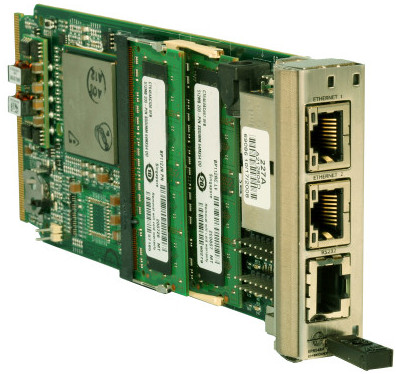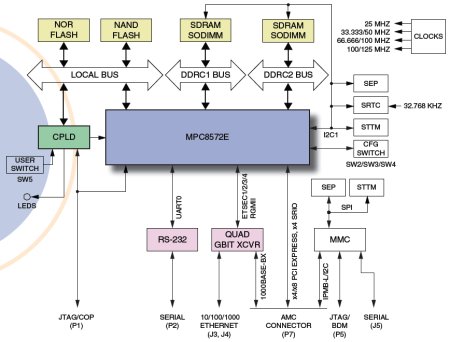AMC board gains Linux development platform
Sep 2, 2009 — by Eric Brown — from the LinuxDevices Archive — 7 viewsEmbedded Planet has announced a Linux BSP and development environment, created by Timesys Corp., for its PowerPC-based EP8572A Advanced Mezzanine Card (AMC) networking board. The board offers dual-core Freescale MPC8572 processors, dual, AMC-compliant gigabit Ethernet ports, and ships in various Serial RapidIO and PCI Express configurations.
Embedded Planet announced the EP8572A board in May 2008, following in the tradition of its other Freescale PowerPC-based boards, dating back to 2006, that comply with the AMC networking board format The EP8572A was originally released with basic board support packages (BSPs) for Linux, VxWorks, and Green Hills Integrity, but now the vendor has followed up with a more robust "Linux solution" developed with Timesys, using the latter's LinuxLink 3.0 embedded Linux development platform. (Timesys has been supporting Embedded Planet boards since 2002.)

EP8572A AMC board
Developers working on applications for the EP8572A AMC board can use the new "Factory" automated web-based build system, which includes wizards for creating an initial Linux starting image. The Factory build engine enables customers to design and build a custom Linux platform from source code, says Timesys. Customers can select from the latest GNU-based optimized toolchains enabled with uClibc and glibc libraries, says the company.
EP8572A AMC
The EP8572A AMC is a full or mid-height single-width AMC.0 board targeted at applications including wireless basestations, media gateways, enterprise network access systems, test and measurement systems, and server blades, says Embedded Planet. The board is built around a dual-core Freescale PowerQUICC III MPC8572 processor, with each e500 core clocked at up to 1.5GHz. The EP8572A AMC offers two SODIMM slots that can hold up to 4GB RAM, and it also supplies up to 256MB of NOR flash and 4GB NAND flash, says the company.

EP8572A AMC block diagram
(Click to enlarge)
Embedded Planet has spun versions of the board available in three configurations:
- Serial RapidIO on AMC channels 4-7
- PCI Express on AMC channels 4-11
- SCOPE-compliant PCI Express on channels 4-7, and Serial RapidIO on channels 8-11
In addition to the AMC configuration the EP8572A can operate as a stand-alone module and boot from on-board flash, says the company. This is said to enable rapid application development outside of the integrated ATCA or MicroTCA environment.
Stated Tim Van de Walle, President of Embedded Planet, "We are confident that the LinuxLink development environment, together with expert Linux technical support available from Timesys, will allow our customers to accelerate their time-to-market while leveraging all the benefits of a true open-source solution."
Availability
The Embedded Planet EP8572A AMC board with the Timesys Development Center CD is available now. For a limited time, developers can obtain free trial access to LinuxLink on the EP8572A platform by registering here, and entering promotion code "PREP8572A" on the sign-up form. Additional information about LinuxLink subscriptions for the Embedded Planet platform can be found here.
More information on the EP8572A AMC board may be found at Embedded Planet, here.
This article was originally published on LinuxDevices.com and has been donated to the open source community by QuinStreet Inc. Please visit LinuxToday.com for up-to-date news and articles about Linux and open source.